| |
|
For additional information,
see the September 9, 2001 E-Forum for the 6-year voting records of Richmond Mayoral candidates.
A
lot can be learned by studying the voting record of candidates
who have served on the City Council, although the vast majority
of items before the City Council are perfunctory resolutions,
ordinances, contracts and other actions required for the routine
operation of city government.
Perhaps
contrary to popular perception, most items before the City Council
proceed to a vote with little or no comment or debate and are
adopted unanimously. Consent calendar items are considered so
routine that multiple items are passed with a single vote, unless
an individual council member or member of the public request
its removal.
The
relatively few items that generate disagreement and debate among
council members, as well as testimony from the public, take
up a disproportionate amount of time relative to their number.
They are important, however, in revealing the underlying political
philosophies and loyalties of individual council members. The
issues that tend to generate the most dissension include land
use and design, capital project financing, City employee bargaining
units, and issues involving special interests such as developers,
Richmond Sanitary Service and Chevron.
The
following discussion is intended to illustrate voting patterns
on representative contested issues and groups of similar issues.
There are, however, always inconsistencies, and this summary
is not intended to be either comprehensive or exhaustive. Council
members who are no longer on the Council have been omitted from
the discussion so that the focus can be on the current City
Council members. This is intended to be thought provoking, and
comments, corrections and additions are welcome. |
| 
With his own home overlooking the Chevron Refinery,
Butt has been a witness to many fires, gas releases
and explosions over the years. He knows how fearful
the community is for its safety. Butt wrote the resolution,
passed unanimously by the City Council, directing
City staff to draft an Industrial Safety Ordinance.
|
|
Capital
Projects and Public Works Issues
Bates
and Griffin have a record of opposing the sale of bonds for
capital improvements and anything related to the improvement
of the facilities of Municipal Sewer District No. 1, Richmond’s
collection system and wastewater treatment plant that serves
approximately 60 percent of the city. Fore example:
- Bates,
along with Griffin, opposed sale of $40 million of bonds on
October 19, 1999 (Resolution 167-99) to upgrade the sewer
system and treatment plant and the necessary rate increase
to service the bonds.
- Bates
has continued to vote against contracts with various consultants
required to implement the wastewater facility upgrade, but
he did not oppose release of the RFI on April 1, 2000, to
see who was interested in taking over the plant.
- When
staff, on January 30, 2001, recommended pursuing four options
for operation, Butt, Penn, Griffin, Belcher, Bell, Anderson
and Corbin voted “yes,” and Bates opposed with Marquez abstaining.
Bates and Griffin
also voted in the year 2000 against issuance of Redevelopment
and Capital Improvement Bonds that will be used for widespread
improvements to streets, parks and public buildings. For the
year 2000 capital improvement bonds, Bates and Griffin were
joined in their opposition by Bell. Similarly, Bates voted,
in 1996, against placing a bond issue on the ballot to allow
the voters to decide on a $60 million bond issue for capital
improvements.
|
| 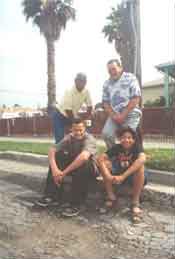
Tom
Butt has voted for every initiative to provide funding
for capital projects in Richmond, including deteriorated
streets such as the one shown above.
|
|
| Clean
and Safe City Issues Claims
from injuries on damaged sidewalks cost the City dearly, and
by State law, sidewalk maintenance is the responsibility of
the abutting property owner. On May 9, 2000, an ordinance amending
the Municipal code to make abutting property owners liable for
claims resulting from dangerous sidewalk conditions not caused
by City trees was passed with the support of Butt, Penn, Anderson
and Corbin. Bates and Marquez. Griffin and Bell voted “no.”
Bates
routinely opposes levying assessments for lot cleanups, boarding
of vacant buildings, and demolition of unsafe buildings on properties
that have been cited as nuisances. For example, on December
14, 1999, Resolution 206-99 for lot cleanup assessments passed
with the support of Butt, Pen, Marquez, Griffin, Bell and Corbin,
with Bate voting “no.” Anderson was absent.
On
October 12, 1999, a proposed ordinance to ban “camping,” which
was seen by some as an “anti-homeless initiative,” was tabled,
with Marquez, Bates, Griffin and Corbin supporting and Butt
dissenting. Anderson abstained. |
| 
For
six years, Butt has voted for every authorization
to abate nuisances and lien the offending properties.
|
|
El
Sobrante Development Issues
Bates
has almost always been a leader in pressing for annexation and
development of land in the El Sobrante Valley, including the
fringe unincorporated areas. He has also carried measures to
assist property owners in raising the value of their land.
- On
December 12, 1997, Bates moved for the City to pay for appraisals
for El Sobrante parcels outside city limits, with both low
density and high density scenarios, in what some considered
an effort to help the owners get the best price for their
land, should the East Bay Regional Park District buy it. The
measure passed, with Anderson, Bates and Griffin in support
and Butt and Corbin opposing.
- Later
when LAFCO wanted to reconcile the Urban Limit Line and the
Sphere of Influence, leaving the same parcel outside, Bates
led an unsuccessful battle against LAFCO, but only after getting
the support of the City Council on January 4, 2000, with a
vote of 6-3, with Bates, Penn, Marquez, Anderson, Bell and
Griffin supporting Bates, and Butt and Corbin opposing.
- When
Bates wanted to help place a representative friendlier to
development on LAFCO, the City Council tabled his motion on
April 3, 2001.
On
April 20, 1999, Anderson moved to continue consideration of
the El Sobrante moratorium for one month. The motion passed
5-2, with Marquez, Anderson, Bates and Griffin supporting and
Butt opposing. However, on April 6, 1999, the final map for
Canyon Oaks was approved 5-1-1, with Bates dissenting, citing
relationship with the proposed moratorium.
|
| 
Butt
has consistently opposed poorly planned development
in the El Sobrante Valley and supported the comprehensive
City-County planning effort and the moratorium on
new development.
|
|
Labor
and Employment Issues
Support
for various City bargaining units typically divides the City
Council in predictable ways. The largest unions are Richmond
Police Officers Association (RPOA), Richmond Firefighters Local
188, and SEIU Local 790.
- Bates
and Griffin routinely support RPOA and Local 188 issues, and
Bates typically opposes Local 790 issues.
- Marquez
generally joins in support of RPOA and Local 188.
- Butt
is generally the only one to have taken on and opposed actions
favorable to Local 188.
- In
a posturing move in April of 2001, to support a new retirement
plan favorable to RPOA and Local 188, Bates moved to bypass
the formal negotiating process and place the “3% at 50” proposal
on the following week’s agenda for vote. The item was, however,
tabled, with Butt, Penn, Bell, Anderson and Corbin voting
“yes,” and Bates, Marquez, Belcher and Griffin voting “no.”
- When
the reappointment of Joan Kubota was considered on November
2, 1999, Bates cast the only “no” vote, presumably because
Kubota, a lawyer, was opposed by the RPOA.
On
job reclassification and salary adjustment issues for employees
other than police and firefighters, Bates typically votes a
lone “no.”
Labor
issues, in general, enjoy unanimous City Council support, for
example, Resolution 37-01A on April 3, 2001, in support of project
labor agreements. However, when release time for Marshall Walker
to serve as president of SEIU 790 came up on April 23, 1996,
Bates broke from the rest of the Council and voted “no.” But
when Powers placed a discussion of the matter on the June 22,
1999, agenda, Bates joined with the rest of the Council in tabling
the motion.
|
| 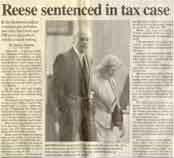
Despite
a felony conviction for tax evasion connected to his
lobbying activities and a hefty fine for lying to
the FPPC, Reese continues
as a power broker in Richmond politics, closely allied
with the RPOA and Firefighters
local 188.
|
|
Land
Use Issues
Land
use issues typically involve appeals from the Planning Commission
or Design Review Board. For neighborhood issues, Corbin and
Butt, sometimes joined by Marquez and Griffin, are most likely
to support neighborhood groups opposing specific projects.
- For
example, the appeal on February 24, 1998, by a property owner
of a Planning Commission decision denying a subdivision was
supported by Marquez, Anderson and Bates. Corbin and Butt
voted “no’” with Griffin absent.
- When
Eleanor Loynd appealed DR 00-68 on November 28, 2000, the
entire Council supported her with the exception of Bates.
- On
October 22, 1996, when the controversial Castro Ranch Road
project, Resolution 160-96, came up for annexation approval,
Butt, Marquez and Corbin voted “no,” while Griffin, Bates
and Anderson voted “yes.”
- On
March 4, 1996, the owner of a gas station/market appealed
CP 95-27 after the Planning Commission denied a conditional
use permit to sell alcoholic beverages. He City council, with
Bates, Griffin and Anderson voting “yes,” overturned the Planning
Commission, granting the use permit and a letter of convenience
and necessity. Butt, Corbin and Marquez opposed.
Of
all the council members, Butt has the best record for supporting
neighborhood groups opposing projects. On several land use issues,
Butt has found himself alone or part of a small minority supporting
an appeal brought by neighborhood groups.
- On
March 17, 1998, a group of neighbors appealed CU 97-35/CD
97-43 on the grounds of insufficient parking. The appeal failed,
with Butt as the only supporter of the appeal.
- On
October 5, 1999, another appeal of a variance related to parking
for a residence on Western Drive (Resolution 156-99) was denied,
with Marquez, Anderson, Bates, Griffin and Corbin voting to
deny the appeal, and Butt voting “no.”
- On
January 23, 2001, the Point Richmond History Association appealed
Variance VOO-01 and Design Review Permit DR 00-105. The appeal
failed, with Penn, Marquez, Griffin, Belcher, Bell, Anderson
and Bates supporting the applicant and only Butt voting “no,”
with Corbin abstaining.
- On
the matter of the appeal by Corky Booze on CU 99-41, April
4, 2000, only Butt and Griffin supported Booze, while Bates,
Penn, Marquez, Bell and Anderson supported the applicant.
- On
July 20, 1999, the applicant appealed the Planning Commission
denial of CD 99-7/V 99-4, and the Council overturned the Planning
Commission 6-0-1, with Butt abstaining and Marquez absent.
- On
July 13, 1999, Ordinance 13-9 was proposed to rezone an area
in the Iron Triangle to higher density. Despite opposition
by the neighborhood council, it passed 6-2, with Butt and
Griffin dissenting.
- On
June 29, 1999, the owner appealed CU 99-7, Planning Commission
denial of a conditional use permit for a bar and lounge. The
appeal was granted 6-2, with Corbin and Butt voting “no.”
- On
June 29, 1999, an order to vacate a street used for parking
by a church was heard. The motion to approve the vacation
failed 4-3, with Marquez, Anderson and Corbin voting “yes,”
and Bates, Butt and Griffin voting “no.”
- On
January 26, 1999, Robert Kish appealed the EIP approval of
the EIR for the Brickyard Cove commercial building. After
Butt inserted a condition in it that incorporated a letter,
acceptable to the appellant, by Gary Schaefer into the EIR
(Resolution 6-99), the appeal was denied 5-2, with Griffin
and Bates voting “no,” On October 12, 1999, the Council voted
to rezone ”Seacliff Estates” as a widely opposed Planned Area
Development, Ordinance 45-99. It passed with Anderson, Bates
and Griffin, supporting, Butt and Corbin voting “no’” and
Marquez abstaining. On February 8, 2000, SunCal appealed the
Planning Commission denial of TM 7502R (Seacliff Estates).
The appeal prevailed with Bates, Penn, Griffin, Bell and Anderson
supporting SunCal. Butt and Marquez opposed.
- On
May 4, 1999, the El Sobrante Valley Legal Defense Fund and
Friends of Wildcat Canyon opposed approval of the Pearl Ridge
800 MHZ antenna until the PDRB had reviewed it. A motion to
approve that did not include mandatory PDRB approval passed
6-1, with Butt dissenting and Griffin absent.
- April
6, 1999, appeal by Hermann Welm from Planning Commission denial
of RZ90-15, a revision of the Final Development Plan for Point
Pinole Properties. Appeal granted 5-2, with Anderson, Bates,
Griffin and Corbin voting “yes,” and Butt voting “no.”
- On
February 23, 1999, Butt went against the neighborhood and
supported an appeal by Corky Booze to avoid an EIR in seeking
to reverse a rezoning of his property that took lace in 1994.
The appeal failed, with Marquez, Bates, Griffin and Corbin
opposed, and Butt in favor
Bates
and Griffin have always found the Planning Commission too “anti
development” to suit their tastes, and on February 20, 1996,
Bates, Griffin and Anderson pushed through an ordinance amendment
reducing the City Council votes required to reverse a Planning
Commission decision from 6 to 5. Bates also voted against the
appointment of both Strauss and Finlay to the Planning Commission.
|
| 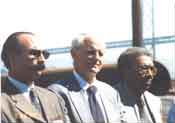
Butt
is sometimes joined by Marquez and Griffin in supporting
neighborhoods on land use and design issues.
|
| 
Butt
supported the Planning Commission denial of a revised
Final Development Plan at Point Pinole Business Park.
Butt was not opposed to the project, he just felt
it could have been designed a little better to provide
the quality of project Richmond needs.
|
| 
Tom
Butt has been a staunch defender of urban creeks and
has fought projects that threatened the integrity
and ecology of Rheem Creek, Baxter Creek, Wildcat
Creek, Central Creek and San Pablo Creek.
|
| 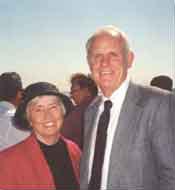
Ex-Mayor
Corbin and Councilmember Butt often voted alike in
representing the minority position of the City Council
in land use and design issues.
|
|
| Fiscal
Policy Butt,
Bates, Griffin and Bell are most likely to cast votes against
items that they see as fiscally frivolous. For example, on December
7, 1999, funding for the relationship with Regla, Cuba, passed
5-3-1, with Penn, Marquez, Anderson, Bell and Corbin voting
“yes,” and Butt, Bates and Griffin voting “no.”
Bates
and Griffin have shown a continuing suspicion of debt and bonding
for municipal purposes, regardless of how sound or important
the measure is.
- Bell
staked out a position on fiscal responsibility by opposing
subsequent changes to adopted budgets. On November 23, 1999,
he was the lone dissenter to Resolution 103-99 adjusting the
Fiscal Year 199-00 Budget.
- On
September 27, 1999, the Council voted to place on the ballot
a charter amendment that would allow the City Council to set
limits on the city manager’s authority to enter into contracts
rather than the current arbitrary limitation of $10,000. It
passed 6-1-1, with Bates voting “no,” and Griffin abstaining.
- On
March 30, 1999, Ordinance 9-99 was passed 6-1 to allow issuance
of general Obligation Pension Bonds to provide full funding
of pensions while freeing up excess funds for the general
fund. Griffin voted “no,” and Bates was absent.
|
|
| Wedge
Issues
There
have been some real “wedge” issues over the years. A good example
is the Lobbyist Ordinance. It passed on December 17, 1996, with
Butt, Corbin and Marquez supporting and Anderson, Bates and
Griffin abstaining.
The
most contentious issue since 1995 was the saga of selection
of a consultant to prepare the reuse plan for Point Molate.
Not satisfied with the short list selected to be interviewed
by staff, Griffin, Bates and Anderson insisted on interviewing
all the candidates, eventually reaching down to one ranked low
by staff to which to award the contract. Butt cried “foul” and
eventually prevailed on the Navy to compel the City to repeat
the whole process. Feelings and egos were bruised during he
process, in which accusations were made by Butt regarding meddling
by Darrell Reese and possible quid pro quo deals. Griffin, Bates
and Anderson hired an attorney and threatened to sue Butt. Eventually,
the consultant ranked first by staff was awarded the contract.
Butt
has introduced resolution to adopt Robert’s Rules of Order twice,
the latest on May 2, 2000. The motion failed with Bates, Penn,
Anderson, Marquez and Corbin abstaining. Butt, Bell and Griffin
voted affirmatively.
On
the appointment of Charles Belcher to the City Council, the
first vote divided with Bates, Penn, Anderson, Griffin, Bell
and Anderson supporting, and Butt, Marquez and Corbin abstaining. |
| 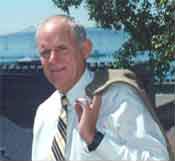
Butt’s “Battle of Point Molate”
left bruised feelings and damaged relationships with
colleagues for
years.
|
|
| Chevron
Issues
Butt
continues to feel that Chevron has too many privileges not enjoyed
by other Richmond business and does not contribute to Richmond
in way commensurate with the company’s wealth and presence.
Other City Council members typically support Chevron, and Butt
has been on the losing end of many measures he sponsored to
correct his perceived inequities. Sometimes Butt is, however,
joined by Corbin and Marquez. For example, On June 29, 1999,
Chevron asked Richmond to hire and independent consultant chosen
by Chevron to provide oversight of Chevron’s reorganization.
The item was approved by Anderson, Bates, Griffin and Corbin,
with Butt and Marquez voting “no.”
The
measure with the largest potential ramifications was Butt’s
proposal to remove the cap on Chevron’s Utility User Tax. It
has been introduced and rejected twice.
Bates
has been, over the years, Chevron’s strongest cheerleader. For
example, on October 12, 1999, Butt sponsored a Resolution requesting
City Attorney to provide a legal opinion on ownership of intertidal
lands. Passed 7-0-1. Bates abstained. |
|
| Voting
Blocks and Patterns Over
the years, voting blocks and patterns have undergone subtle
changes as political alliances changed. Until about three years
ago, Anderson frequently joined Bates and Griffin when votes
split on controversial issues. These were generally the same
issues that had the support of Darrell Reese, Local 188 and
the BMW. Sometimes, there was evidence that Darrell Reese had
something to gain as a lobbyist.
Over
the last couple of years, however, Anderson has moved out of
that block and has been more likely to join Corbin, Marquez
and Butt, who tend more often than not, to join in supporting
issues involving the environment, quality development and issues
contrary to traditional special interests.
Corbin
has carved out a niche of her own in opposing anything perceived
as beneficial to Richmond Sanitary Service and contrary to the
interests of Richmond citizens.
Overall,
Anderson is most likely to vote with the majority on any contested
issue, and rarely takes an independent stand.
Bates
and Butt share the record for ending up on the losing end the
most of 8-1 votes. Although Butt loses a lot, he also wins a
lot on measures he wrote or sponsored. On a related note, Bates,
Butt and Griffin are the most likely to question the wisdom
of staff or even criticize staff in public. This usually draws
return criticism from their colleagues, who more often tend
to support and defend staff.
Butt
wins, hands down, in showering the most attention on staff with
questions involving constituents’ complaints and details of
City operation and policy. For this, he is routinely criticized
by his colleagues, and occasionally by the city manager. Butt
has no apologies. |
| 
January
20, 1998, Gioia and McMillan
blast Reese – “The Black Men and Women Organization
is being controlled by a ‘white, conservative Republican,’
who doesn’t even live in the city, former City Councilman
Jim McMillan said Monday.” West County Times, January
20, 1998.
|
|

|